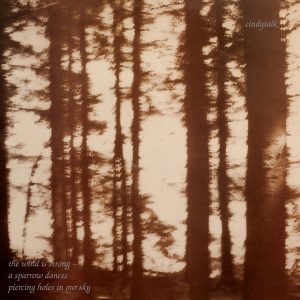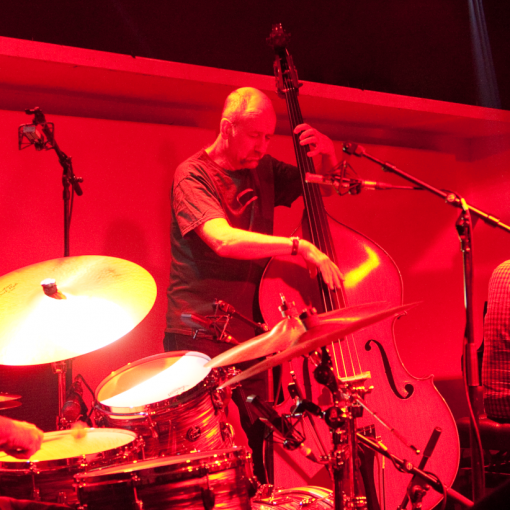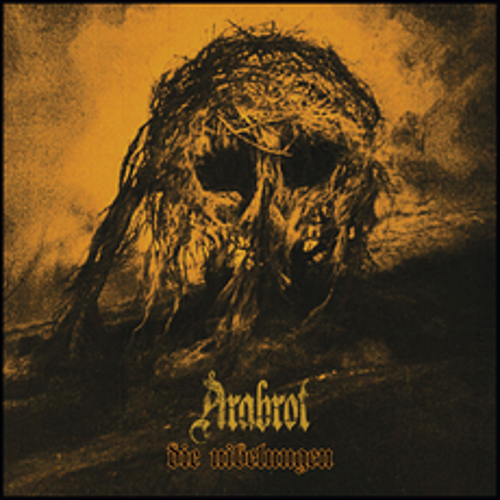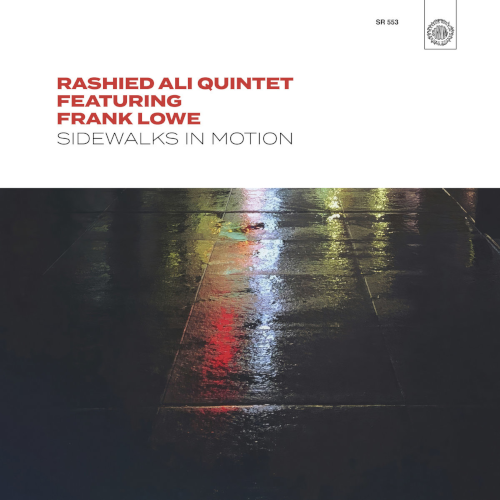 I’ve been enjoying the broken mirror of Cindytalk’s music for well over thirty-odd years now. The blazing rawness of Camouflage Heart was a great starting point, and the weird dichotomy of it’s follow up In This World reinforced the love with its contrasting chromatics of classical ambiance and psychotic passion.
I’ve been enjoying the broken mirror of Cindytalk’s music for well over thirty-odd years now. The blazing rawness of Camouflage Heart was a great starting point, and the weird dichotomy of it’s follow up In This World reinforced the love with its contrasting chromatics of classical ambiance and psychotic passion.
Now the follow-ups to these early albums, The Wind Is Strong… (1990) and Wappinschaw (1995) finally see the light of day again through Dais after being out of print for decades.
It was plain to see from it’s predecessor In This World that the next album would favour a reflective fervour — “Touched” or “Angels Or Ghosts”‘ contaminated colours certainly hinted at it – a cinematic slant that I like to think leaked over into Cindytalk’s third album and the first to be re-issued here.
A brave instrumental exploration entitled “The Wind Is Strong” was originally envisioned as a soundtrack to Ivan Unwin‘s film Eclipse (which I think is still frustratingly unreleased) and has a lovely fragmented under-polished feel that evils the recognisable, as well as some shadowy other. Listening back, it still holds its own rather well after all this time, that slow distorted textural creep pulling at the corners of the room, inwardly navigating you into that environmental illusion of fleeting landscape and fractured timeline. Devoured on headphones, this glows aplenty, a weird spidery magnificence whose many details collide and corrode in your mind’s eye, scribbled over with melodic sparseness and brief dronic visitation. A late night masterpiece that sips reflective one minute to burn nomadically the next, all stained in generous unease. Cindytalk’s fourth album Wappinschaw shifts eclectically in a jigsaw of numerous moods, sketched impressions, snippets of Scottish culture threading throughout, even a touch of tenderness here and there.
Cindytalk’s fourth album Wappinschaw shifts eclectically in a jigsaw of numerous moods, sketched impressions, snippets of Scottish culture threading throughout, even a touch of tenderness here and there.
The next introduces an unforeseen softness to the Cindytalk persona, “A Song Of Changes” a chalky uplift to its darkened normality, the song’s soft horizontal drift romancing a loving memoir, before “Empty Hand” scuzzes things back up again. All back-combed wasp and splattering percussives, that dark literary voice curling round it, words like bones pushing up from under tensing skin. The worming thistle that vultures the glinting frets and country twang of “Return To Pain” has it too, a confetti of fragmentary pleasures maniacally burning the tempo, then basking in its gorgeous aftermath.
A curious spoken word interlude intersects. It sounds like Ivor Cutler, but it is in fact Alisdair Gray reading an extract from his labyrinthine epic Lanark, its matter-of-factness subtly undershoot by the chimes of an ice cream van as the narrative surreally slips elsewhere, smashing unexpectedly into a breathtakingly brutal collage of noise and screaming skull. Its barbarous zeal is far removed from the calming balm of “Snowkisss”, one of the most beautiful things Cindytalk have done, a delicate bleed harmonically floating though, pearling piano periodically puncturing as Sharp’s lyrics become feathers falling between soft sonic scissors.The eerie scenics of “Secrets And Falling” follow, fill the space with corroded shapes, atmospherics that splinter then fall away to reveal a gnarly nugget lyrically spiralling to the ground like the fallen angel he describes. Picking at the darkness that swims inside our decisions and hopes, the tightening knots of “Disappear” languish. His lyrics always lounge in ambiguity and inspiration seems to fly in from everywhere, but feathers / flight / falling become recurring themes as they derisively turn, stab devotionally to love tasted and lost, the hanging feather of the cover a talisman torn from the psyche now flightless.
The sticky stigmata of trumpet on “Träumlose Nachte” wordlessly captures that sense of forlorn with discoloured precision, loosely pinned by a scattering of piano. Lovely introspectives spill over into “And Now In Sunshine”, a fine bit of acheronic swagger that tensively tinders, rhythmically carpeted in bass and percussive after-soak, those flourishing trumpets leaking into the slow languid burn of “Prince Of Lies” that throws shadows down a gloomy half-lit stairwell whilst picking at its emotional scabs. The kerosened curl of the previous track is exiled by the acoustic lament of “Hush”, a fluttering folk slant bleeding into a touristy bagpipe / drone sunset. there is a distended sense of calm before the incendiary bomb of “Muster” explodes through the speakers, which has Sharp summoning up revolutionary spirits to an atonal moshpit. His images burn with immediacy, falling into full invocation, yelling forth long-dead luminaries to rise as garlands of distorted lasered light and roaring overload. “BEAUTY WILL BE CONVULSIVE OR NOT AT ALL”, he states, and I would concur.A fitting finale that Dias have tagged a few extra session tracks on to, three rarities that mind-shimmer and stare at the sun through half-closed eyes. The Wind Is Strong… and Wappinschaw are two neglected albums that finally can grab the attention they deserve.
-Michael Rodham-Heaps-



